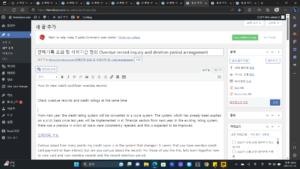How to view credit card/loan overdue records
Check overdue records and credit ratings at the same time

From next year, the credit rating system will be converted to a score system. The system, which has already been applied on a pilot basis since last year, will be implemented in all financial sectors from next year. In the existing rating system, there was a practice in which all loans were consistently rejected, and this is expected to be improved.
Curious about how many points my credit score is in the system that changes? It seems that you have overdue credit card payment or loan interest, but are you curious about the record? For those of you like this, let’s learn together how to view card and loan overdue records and the record retention period.
Why should I build my credit score?
If you are preparing for personal rehabilitation, you probably know why credit scores are important. To maintain a good credit score, it is important to pay your credit card bills consistently and consistently. As you all know, the more you borrow money and pay it back on time, the more points you get. The higher the score, the more benefits you can receive.
The lower the credit rating, the higher the interest rate and the less money you can borrow. Conversely, the higher the credit rating, the lower the interest rate and the more money you can borrow. If you need a loan urgently, having a good credit rating will be of great help.
That’s why you need to check your delinquency record. If you have not paid your credit card bill or loan interest on time, check your overdue record to see when the overdue record is deleted. Checking these dates can help you determine when it might be appropriate to do so the next time you need a large loan.
How to view credit card and loan delinquency records
1. Enter the Nice Jikimi homepage. You can do a credit inquiry for free through identity verification, and both members and non-members can do it.
NICE Jikimi
No. 1 credit rating agency, nice credit habits that increase your credit score
www.credit.co.kr
2. On the main page of the homepage, select Experience▶National Credit Inquiry▶National Free Credit Inquiry (Member/Non-member) menu.
3. After agreeing to the terms and conditions, enter your personal information and verify your identity.
4. You can check ‘default information’ and ‘short-term overdue details’, and you can also view your current credit rating at the bottom.
Overdue records, how long do they remain? can’t you remove it?
Overdue records have different retention periods depending on their nature. First of all, overdue records can be viewed from 100,000 won or more. Occasionally, there are people who know that there are disadvantages for overdue payments, even if they are only a few tens of won, but this is not the case. Systematically, if it is less than 100,000 won, it cannot be seen in the record.
If you have over 100,000 won overdue for more than 5 days and less than 90 days, the record retention period is 3 years, and for long-term overdue over 90 days, the retention period is 5 years. Your credit rating will continue to be affected by this delinquency record for as long as it exists. You can also search in the financial sector. The storage period starts from the day the full amount is paid off, and the overdue record is deleted only when the short-term or long-term storage period ends.
During consultations, there are often inquiries about when the overdue record will disappear. If you have done personal rehabilitation, you can release this delinquent record as you start to pay the repayment after the decision to approve personal rehabilitation is made. If there is an overdue record, you have a problem with your credit rating and you have to settle your debt. In this case, you can get help with personal rehabilitation.
If you inadvertently overlook the overdue record, there may be restrictions on financial transactions. Everyone knows that once your credit rating is dropped, it is difficult to raise it again. Be careful not to overdue as much as possible.